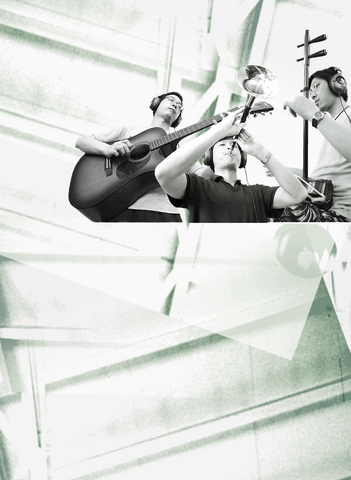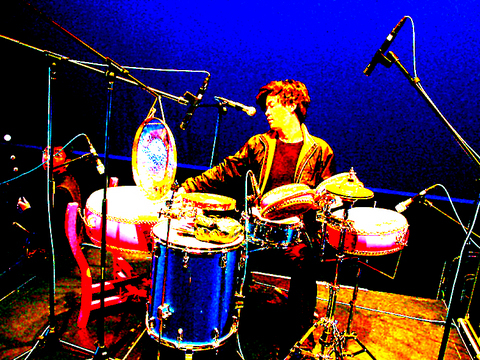Popular contemporary Hakka five-piece, the Hohak Band (
Formed by ex-members of long-serving protest combo Labor Exchange (
Since Labor Exchange's success five years ago, singer-songwriter and Hohak frontman, Chen Guan-yu (

"Our music is very different from that of Labor Exchange. Unlike [Labor Exchange], where we merged music with political messages, the Hohak Band makes happy, easy-going music that shouldn't be taken too seriously," Chen said. "For us the melody is more important than what chord or what key the song is performed in."
While such an odd and eclectic concoction might sound like a recipe for musical disaster, it has in fact enabled the band to appeal to audiences whenever it performs.
The band's July appearances in Taipei were packed out, as were its numerous performances at smaller venues in sou-thern Taiwan, where audiences consisted of both the young and old alike. At last week's Formoz Festival (

The Hohak Band's knack of attracting such diverse audiences is based around its ability to perform sets packed with happy-go-lucky tunes. And even though the band waxes lyrical in the Hakka dialect, it has successfully managed to cut through linguistic barriers. The combo appeals to both native Hakka speakers as well as those with zero understanding of the Southern Chinese dialect.
"You don't need to understand the lyrics to enjoy our music. I mean people in Taiwan like Western music, and not everybody understands English," Chen said. "People can understand that the message we are trying to put across is `be happy' simply from the music itself."
"The mix makes it very special. If you listen to the album then its easy to hear how spiritual our sound is, especially on the tunes which incorporate West African influences," Chen said. "Hakka music has traditionally been spiritual, but by combining the old with the new we've taken the sense of spirituality to new levels."

PHOTO COURTESY OF TCM
Released by local indie label Taiwan Colors Music in late June, Hohak Carnival has already drawn praise from many in both the alternative and mainstream music industries. And, while still a full year away, it has already been touted as a sure-fire nominee for next year's Golden Melody Awards.
There are slow acoustic and folksy reworkings of traditional tunes like the pleasing Playing and Singing (
"Most young people think that these instruments are dead. They were a part of the old world and as such have no part in modern music. I think we've proven them wrong," Chen said. "The erhu and suona are very important elements of the music. I hope that along with sculpting a new style of music we can also introduce [the erhu and suona] to young people who are dismissive of old and classical instruments."
In addition to the standard crossover material the Hohak Band also takes the time to dabble in rap. Destitute Man (
More about Hohak:
What: Hohak Band Live at the Red House
Where: Red House Theater, 10, Chengdu Road, Taipei (台北市成都路10號).
When: 8pm tomorrow
Tickets: Tickets cost NT$500 and are available at the door.

The canonical shot of an East Asian city is a night skyline studded with towering apartment and office buildings, bright with neon and plastic signage, a landscape of energy and modernity. Another classic image is the same city seen from above, in which identical apartment towers march across the city, spilling out over nearby geography, like stylized soldiers colonizing new territory in a board game. Densely populated dynamic conurbations of money, technological innovation and convenience, it is hard to see the cities of East Asia as what they truly are: necropolises. Why is this? The East Asian development model, with

June 16 to June 22 The following flyer appeared on the streets of Hsinchu on June 12, 1895: “Taipei has already fallen to the Japanese barbarians, who have brought great misery to our land and people. We heard that the Japanese occupiers will tax our gardens, our houses, our bodies, and even our chickens, dogs, cows and pigs. They wear their hair wild, carve their teeth, tattoo their foreheads, wear strange clothes and speak a strange language. How can we be ruled by such people?” Posted by civilian militia leader Wu Tang-hsing (吳湯興), it was a call to arms to retake

This is a deeply unsettling period in Taiwan. Uncertainties are everywhere while everyone waits for a small army of other shoes to drop on nearly every front. During challenging times, interesting political changes can happen, yet all three major political parties are beset with scandals, strife and self-inflicted wounds. As the ruling party, the Democratic Progressive Party (DPP) is held accountable for not only the challenges to the party, but also the nation. Taiwan is geopolitically and economically under threat. Domestically, the administration is under siege by the opposition-controlled legislature and growing discontent with what opponents characterize as arrogant, autocratic

When Lisa, 20, laces into her ultra-high heels for her shift at a strip club in Ukraine’s Kharkiv, she knows that aside from dancing, she will have to comfort traumatized soldiers. Since Russia’s 2022 invasion, exhausted troops are the main clientele of the Flash Dancers club in the center of the northeastern city, just 20 kilometers from Russian forces. For some customers, it provides an “escape” from the war, said Valerya Zavatska — a 25-year-old law graduate who runs the club with her mother, an ex-dancer. But many are not there just for the show. They “want to talk about what hurts,” she